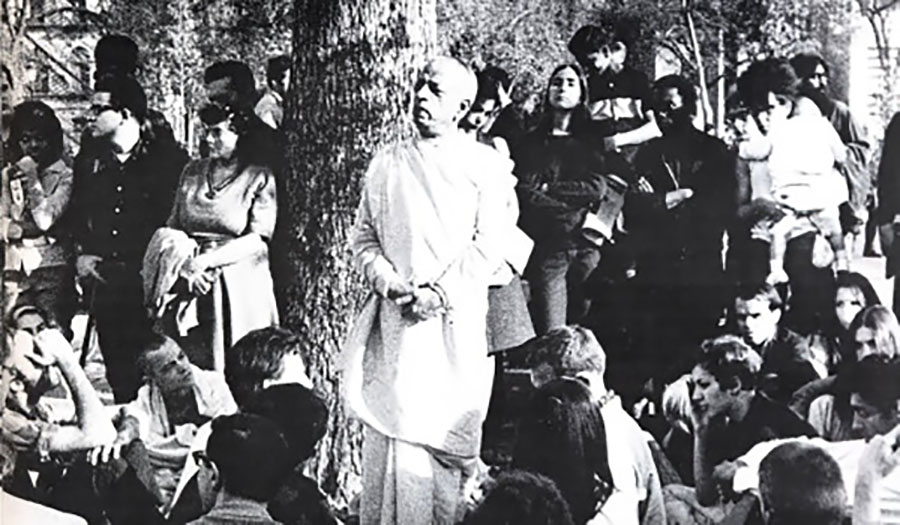ISKCON 50 Meditations: October 20, 2015
By Satsvarupa dasa Goswami | Окт 20, 2015

Dr. Mishra accepted the Absolute Truth in the impersonal feature (or brahman) to be Supreme. Prabhupada stressed the supremacy of the personal feature (or bhagavan), following the Vedic theistic philosophy that the most complete understanding of the Absolute Truth is personal. The Бхагавад-гита says that the impersonal brahman is subordinate to bhagavan and is an emanation from Him, just as the sunshine is an emanation from the sun planet. This conclusion has been taught by the leading transcendental acarayas of ancient India, such as Ramanuja and Madhva. And Srila Prabhupada was in disciplic succession from Madhva. Dr. Mishra, on the other hand, followed Sankara, who taught that the impersonal presence of the Absolute Truth is all-in-all and that the Personality of Godhead is ultimately an illusion. Whereas Srila Prabhupada’s theistic philosophy accepted the individual spirit self (atma) as an eternal servant of the spiritual being (bhagavan), Dr. Mishra’s view accepted that the spiritual self is not an individual. Rather, his idea was that since each person was identical with God, the Supreme Brahman, there is no need to worship God outside oneself. As Dr. Mishra would put it, “Everything is one.”
Prabhupada considered Dr. Mishra a “mayavadi” because of his inadvertent acceptance that maya, illusion, is greater than the Absolute Truth. For Srila Prabhupada, not only was the impersonalist philosophy unpalatable, it was an insult to the Personality of Godhead. According to Krishna in the Бхагавад-гита (7.24 and 9.11), “Unintelligent men, who know Me not, think I have assumed this form and personality. Due to their small knowledge, they do not know My higher nature, which is changeless and supreme … Fools deride Me when I appear in the human form. They do not know My transcendental nature and My spiritual dominion over all that be.” Lord Caitanya had strongly refuted the Mayavadi philosophy: “Everything about the Supreme Personality of Godhead is spiritual, including His body, opulence and paraphernalia. Mayavada philosophy, however, covers His spiritual opulence and advocates the theory of impersonalism.”
A mendicant, Prabhupada was temporarily dependant on the goodwill of his Mayavadi acquaintance with whom he regularly ate and conversed, and with whom he accepted shelter. But what a great inconvenience it was! He had come to America to speak purely and boldly about Krishna, but he was being restricted. In Butler he had been confined by his hosts’ middle-class sensibilities; now he was silenced in a different way. He was treated with kindness, but he was considered a threat. Dr. Mishra could not allow his students to hear the exclusive praise of Lord Krishna as the Supreme Personality of Godhead.
Spending most of his time in his new room, Srila Prabhupada kept at his typing and translating. But when Dr. Mishra held his yoga classes, Prabhupada would sometimes come out and lead a kirtan or lecture.
Robert Nelson (one of Prabhupada’s first young sympathizers in New York): I went to one of Dr. Mishra’s services and Dr. Mishra talked. Swamiji was sitting on a bench and then all of a sudden Dr. Mishra stopped the service and he gets a big smile and says, ‘Swamiji will sing us a song.’ I think Dr. Mishra wouldn’t let him speak. Somebody told me Dr. Mishra didn’t want him to preach.
Years later Srila Prabhupada remembered the situation of the early days of 1965 in a conversation with his disciples. I used to sit in the back and listen to his meetings silently. He was speaking all impersonal nonsense and I kept my silence. Then one day he asked if I would like to speak and I spoke about Krishna consciousness. I challenged that he was speaking manufactured philosophy and all nonsense from Sankaracarya. He tried to back out and said he was not speaking, Sankaracarya was speaking. I said, ‘You are representing him. That is the same thing.’ He then said to me, ‘Swamiji, I like you very much, but you cannot speak here.’ But although our philosophies differed and he would not let me preach, he was kind and I was nice to him















